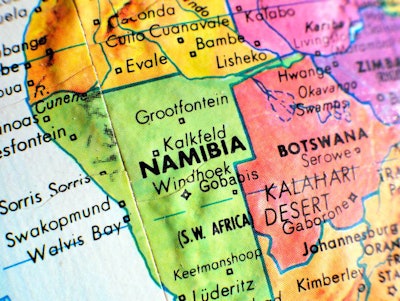
After suspicions of foot-and-mouth disease (FMD) cases in Botswana, Namibia has suspended selected imports from its southern African neighbor.
In Namibia, authorities have announced an immediate ban on the import of cattle and their products from its neighbor to the east, the Republic of Botswana.
According to The Patriot of Botswana, the suspension of trade applies to all cloven-hoofed animals (sheep and goats) and their products. The same restrictions also cover materials that could carry pathogens such as animal feeds, straw, forage and alfalfa.
In a statement, Directorate of Veterinary Services chief veterinary officer said the reason for these tight restrictions is the recent suspicion of foot-and-mouth disease (FMD) in Botswana.
The ban came into effect immediately, and will last indefinitely. Veterinary import permits already issued have been canceled. Meanwhile, through transportation of animals and products specified under the ban may only continue if the vehicles are sealed.
Up until the restrictions were introduced, Namibia imported cattle from Botswana to fulfil beef exports to Europe, the source reports.
FMD confirmed in Botswana
Around 20 cattle at a village in the North East district of Botswana were reported to be showing symptoms of FMD in mid-August. This is according to the official notification from the national veterinary authority to the World Organisation for Animal Health (WOAH).
The cattle belonged to a group of 57 animals at a village in the district, which borders Zimbabwe. Affected animals showed typical symptoms of the disease, including lameness and drooling, as well as vesicles and ulceration on the mouth and feet.
Authorities identified fomites including people and equipment as the source of the infection. The type of FMD virus involved has not been typed.
FMD was last reported in Botswana more than eight years ago — in November 2013.
Over recent weeks, a number of other southern African nations have registered new FMD outbreaks with WOAH — including Malawi, Mozambique, South Africa and Zimbabwe. In North Africa, cases have also been confirmed in Algeria and Libya.
Other developments affecting Namibian cattle production
Since the start of this year, cases of FMD have been registered with WOAH in six South African provinces — a total of 161 outbreaks since March 2021.
Within the past week, Namibia suspended exports of its live cattle to South Africa, reported New Era Live.
According to this source, the restrictions were announced after South Africa reported cases of FMD, and halted the reciprocal trade in order to prevent the spread of FMD virus. This trade suspension will also remain in place until further notice.
As reported across the globe, input prices have been rising for farmers in Namibia over the past year. Increases average 50% since June 2021, reported Namibian this month. Likely in order to take advantage of higher prices and recover elevated costs, more cattle owners have sent their animals to slaughterhouses than a year ago. Between January and June, 60% more cattle went to Namibia’s abattoirs, and 22% fewer to live markets than in the same period of 2021.
No end is in sight to high costs of feed and other inputs for Namibian producers. According to the agricultural union, the ban on cattle movements to South Africa will accelerate the market shift toward the slaughterhouses rather than “on the hoof” sales.
Potential effects on beef exports to Europe
Recently, concerns have been raised by the Meat Board of Namibia over the prospect of a possible future reduction in the nation’s beef exports to Norway. It says domestic beef production there is growing, while demand is in decline, according to a previous report in Namibian.
Under the current agreement, Namibia shares a 3,200 metric ton (mt) quota for beef exports to Norway with Botswana, according to the board. Worth a total of NAD520 million (US$30.5 million), the overall quota is administered under two different schemes. The generalized system of preferences (GSP) quota amounting to 2,700 mt is allocated to Namibia or Botswana on a first-come, first-served basis. For the remaining 500 mt, the two countries can access the market through the European Free Trade Association/Southern Africa Customs Union (EFTA/SACU) via a Norwegian auction.
Recent FMD cases in Botswana will likely force the withdrawal of that country from these schemes. As a result, Namibian farmers may be able to take the opportunity to gain a larger share of the lucrative European beef market — providing it can remain disease-free.
In October 2020, an FMD outbreak in Namibia threatened the nation’s prospects of future beef exports to the United States. In February of that year, the first consignment of beef had left Namibia bound for the U.S. after 18 years of trade negotiations.

















